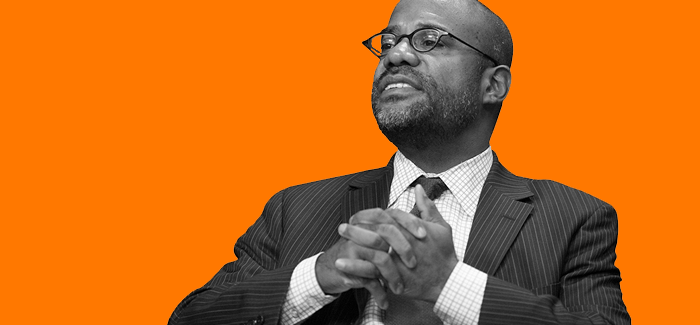
(Center for American Progress, CC BY–ND 2.0)
A new leader brings policy-world experience to Chapin Hall’s vital research on families’ well-being.
This September Bryan Samuels, AM’93, became executive director of Chapin Hall. With 50 experts on staff, the University-affiliated center conducts research designed to inform US policy affecting children and families, including the foster care system, early through secondary education, community development, and juvenile justice. Chapin Hall takes a special interest in the most vulnerable populations.
Samuels was previously commissioner of the Administration on Children, Youth, and Families at the US Department of Health and Human Services; chief of staff at Chicago Public Schools; and director of the Illinois Department of Children and Family Services. The move brought him home full time; during his five years in the capital, he commuted from Chicago, where his wife, Gina Samuels, is an associate professor at the School of Social Service Administration studying transracial adoption and foster care. The Magazine’s interview with him is condensed and edited below.
Chicago to Washington
When I was at CPS from 2007 to 2009, about 550 current students were shot or killed. We wanted to provide more evidence-based interventions related to trauma and violence in the schools that were most impacted. But we didn’t have ongoing funding to support those programs. A whole host of studies demonstrate that being exposed to ongoing or chronic interpersonal violence changes the physiologic, biologic, and neurologic systems in young people as they develop. So one of the goals of going to DC was to see whether we could influence Medicaid policies in ways that would allow states to use it as a vehicle for addressing the trauma-related issues that many poor students face.
Sea change
After a lot of hard work with the Department of Health and Human Services, they wrote a [federal policy guidance] memo last July that went to every state Medicaid officer, state mental health agency executive, and child welfare director in the country. The memo said that based on the science, the federal government believes that child trauma that comes from abuse and neglect or from exposure to violence meets the standard of medical necessity. Therefore states can use federal Medicaid dollars to address trauma-related issues. It was really unusual for them to be willing to make this statement. But I think we convinced them with lots of data.
Imperfect information
The four years I was child services director for the State of Illinois, it was the worst job I ever had but the most rewarding. As much as people would like to believe that child welfare should know all of the right things to do, it’s probably wrongheaded for folks to think it is by definition an evidence-based intervention. Child welfare does what it does because there are really vulnerable children and families that need protecting. But it’s not like you could go to the library and read about all the important issues and know how to make a child welfare system better.
Next-generation research
Chapin Hall’s Fred Wulczyn, PhD’86, who’s mainly focused on child welfare, is doing important work using large databases to knit together the stories of what policies are working and not working. He’s quite literally in the position to simulate, if you changed this particular child welfare policy, what would be the ripple effect across the rest of the system? If we can build that kind of work across other public systems, it would be transformative in helping states make the right decisions about how to use really limited dollars.
Perspective shift
Working here is one step removed from the policy-making process. I won’t have the day-to-day decision making that goes into spending money and making sure it’s being spent in the right way; this job gives me the chance to step back from that process and figure out how as a research institute we help leaders do a better job of making decisions. Having been a consumer of Chapin Hall’s products, I’m in a good position to help shape the way our people approach each project to make the most useful product for the client. That’s the perspective that I bring, hopefully one that will help our clients make hard decisions but make the right decisions.
